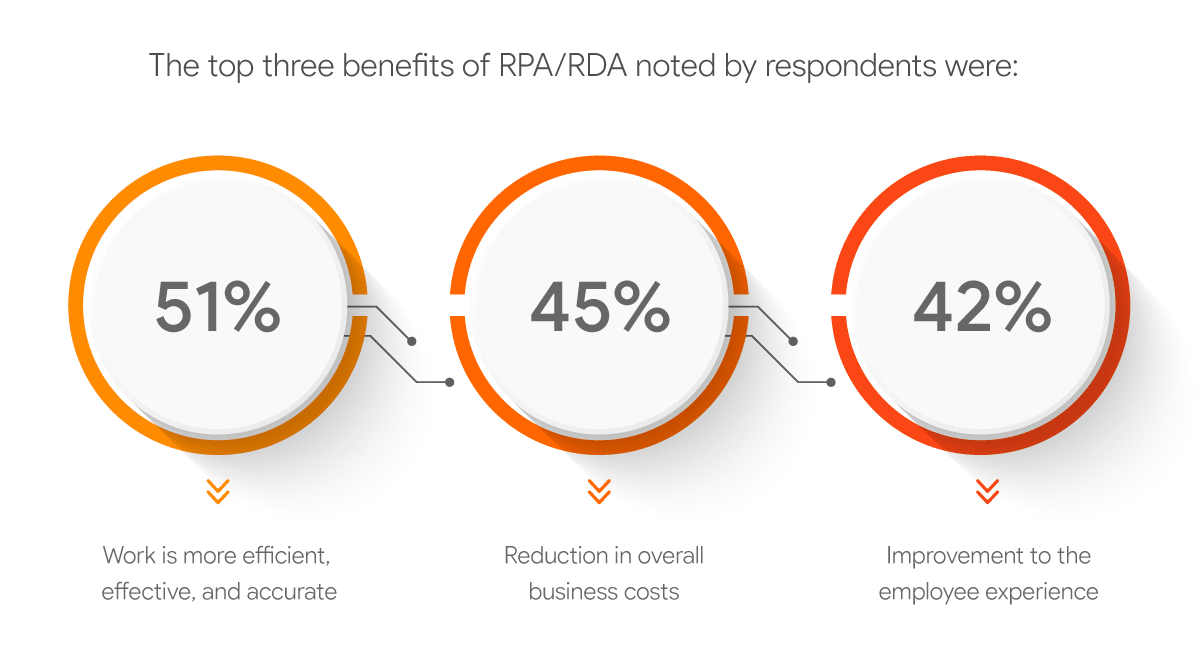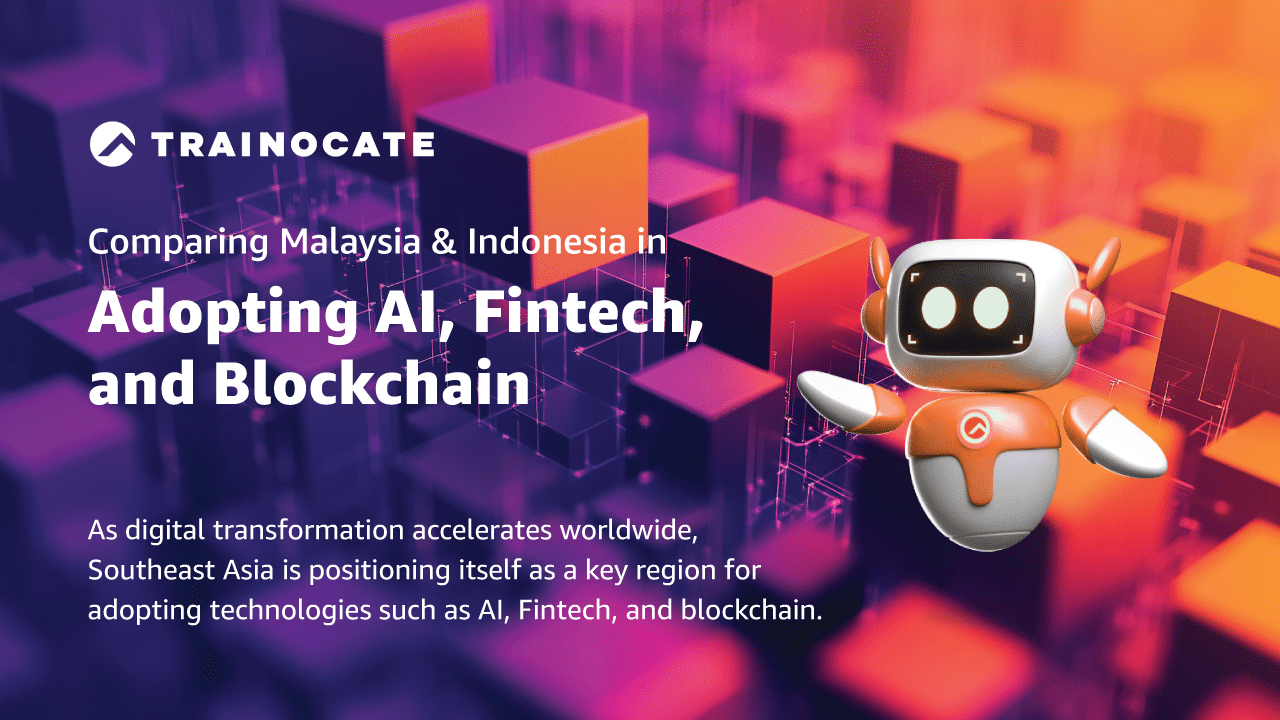5 Reasons to Adopt Automation in 2022 | UiPath
5 Reasons to Adopt Automation in 2022 | UiPath
Get started on your Automation journey with UiPath RPA certification.
The power of automation lies in its ability to help companies offload and get rid of repetitive, mundane tasks that tend to make complex but manual activities much easier. By streamlining, processes as such, can help free up time and allow your team to place their focus on more significant responsibilities. However, what you should avoid is to blindly rely on the automation process to look after every complicated business task.
It is evident that an increasing number of businesses automating their processes and operations over the past decade. In recent times, automation in business is only gaining momentum and shows absolutely no signs of stopping.
It is, however, important to note that process automation is not merely about removing humans out from the bigger picture, it is focused on implementing automation into businesses processes by leveraging software solutions and allowing for a much better allocation and balancing of resources and increased productivity.
A branch of the automation tree: Robotic Process Automation (RPA)
What is robotic process automation?
Robotic process automation (RPA) is a software technology that makes it easy to build, deploy, and manage software robots that emulate human actions interacting with digital systems and software. Just like people, software robots can do things like understand what’s on a screen, complete the right keystrokes, navigate systems, identify and extract data, and perform a wide range of defined actions. But software robots can do it faster and more consistently than people, without the need to get up and stretch or take a coffee break.
As the world has turned digital, technological business solutions continue evolving and opening unlimited opportunities for business. With robotic process automation (RPA), companies now rely on software robots to do mundane work, increasing productivity and quality of delivered products and services. With RPA at its core, a combination of artificial intelligence (AI), machine learning, process analytics and other technologies, hyper automation makes a fully automated enterprise possible.
What are the business benefits of RPA?
Robotic process automation streamlines workflows, which makes organizations more profitable, flexible, and responsive. It also increases employee satisfaction, engagement, and productivity by removing mundane tasks from their workdays.
RPA is noninvasive and can be rapidly implemented to accelerate digital transformation. And it’s ideal for automating workflows that involve legacy systems that lack APIs, virtual desktop infrastructures (VDIs), or database access.

Robotic process automation streamlines workflows, which makes organizations more profitable, flexible, and responsive. It also increases employee satisfaction, engagement, and productivity by removing mundane tasks from their workdays.
Here are a few more reasons to really convince you of the concrete benefits of automation.
1) Accelerated transformation
Among global executives, 63% say RPA is a major component in digital transformation.
2) Major cost savings
RPA drives rapid, significant improvement to business metrics across industries and around the world.
End-to-end automation allows you to holistically plan and efficiently scale your RPA program. While time-to-value varies from company to company, some UiPath users have seen ROI from automation in a matter of weeks.
3) Greater resilience
RPA robots can ramp up quickly to match workload peaks and respond to big demand spikes.
“RPA shoulders the burden of recurring processes, or time-consuming and error-prone manual transfer of data between different systems, freeing up employees across multiple departments and creating time for more important tasks.”
4) Higher accuracy
57% say RPA reduces manual errors.
In an independent study commissioned by UiPath, Forrester Consulting surveyed 100 decision makers at manager level or above from operations groups, shared services, finance and accounting, HR and other core business lines to evaluate how RPA affects employee engagement.
What the report has found is encouraging. 66% said RPA restructures existing work, enabling their employees to have more human interactions, and 60% said RPA helps people focus on more meaningful, strategic tasks.
5) Improved compliance
92% agree RPA has ‘met or exceeded expectations’ for better compliance.
“I am glad we considered compliance and internal controls when going through the RPA journey. A bot increases the quality of the process and allows for consistency and reliability.”
Confidence in RPA’s capacity to deliver benefits such as improved compliance, quality and improved productivity remain high (in the 85% to 92% range). As organizations progress in their RPA journey, they increasingly value these upside benefits as they see how these positively impact their organization.
.
Become a fully automated enterprise with the UiPath Platform and start your automation journey today with UiPath RPA certification.
The UiPath RPA Developer track consists of UiPath Certified RPA Associate and UiPath Certified Advanced RPA Developer.
UIPATH-BASIC: Step into Robotic Process Automation
The Step into Robotic Process Automation (RPA) is an introductory course on RPA. This Certification & Training Course assumes no prior knowledge of RPA and takes a use-case-based approach. The student has an option to choose between Studio and StudioX to complete the course. It begins by defining a real-world, generic problem and how it’s solved in a non-RPA environment. Next, the course teaches skills that enable the students to develop an automation project using free UiPath Studio software (Academic Alliance Edition) to automate the solution.
| Code | Course Title | Days | Fees (RM) | July | Aug | Sept |
|---|---|---|---|---|---|---|
| UIPATH-BASIC | Step into Robotic Process Automation | 1 | RM3,000 | 13 | 12 |
UIPATH-BUSINESS: Introduction to RPA for Business v2.0
The Introduction to Robotic Process Automation for Business course is intended to introduce Robotic Process Automation (RPA) to business and finance students. The course assumes no prior knowledge of RPA. It equips the student with skills that will help him identify automation opportunities in an organization. It deep dives into the different stages of automation journey with a focus on the role of a Business Analyst.
| Code | Course Title | Days | Fees (RM) | July | Aug | Sept |
|---|---|---|---|---|---|---|
| UIPATH-BUSINESS | Introduction to RPA for Business v2.0 | 2 | RM4,500 | 14-15 | 13-14 |
UIPATH-RPAADD: RPA Advanced Design and Development v1.0
The Robotic Process Automation (RPA) Advanced Design and Development course aims at providing a deep understanding and extensive hands-on experience on UiPath technologies such as Studio, Robots, and Orchestrator. It prepares the student to independently build or lead production level automation and complex RPA solutions in the Robotic Enterprise Framework.
| Code | Course Title | Days | Fees (RM) | July | Aug | Sept |
|---|---|---|---|---|---|---|
| UIPATH-RPAADD | RPA Advanced Design and Development v1.0 | 5 | RM8,500 | 25-29 | 26-30 |
UIPATH-RPADD: Robotic Process Automation Design & Development v3.0
The Robotic Process Automation (RPA) Design & Development course offers comprehensive knowledge and professional-level skills focused on developing and deploying software robots. The course assumes no prior knowledge of RPA. It starts with the basic concepts of Robotic Process Automation. It further builds on these concepts and introduces key RPA Design and Development strategies and methodologies specifically in the context of UiPath products. A student undergoing the course shall develop the competence to design and develop a robot for a defined process.
| Code | Course Title | Days | Fees (RM) | July | Aug | Sept |
|---|---|---|---|---|---|---|
| UIPATH-RPADD | Robotic Process Automation Design & Development v3.0 | 5 | RM8,500 | 8-12 |
UIPATH-RPASAP: SAP Automation with UiPath
SAP Automation with UiPath Studio course v3.0 offers basic knowledge and skills focused on developing and deploying software robots for automating processes of SAP WinGUI application. The course assumes that the student has a working knowledge of SAP WinGUI application and has completed Step into RPA or Introduction to RPA for Business course offered through UiPath Academic Alliance. A student undergoing the course shall develop the competence to automate a defined process in SAP WinGUI application.
| Code | Course Title | Days | Fees (RM) | July | Aug | Sept |
|---|---|---|---|---|---|---|
| UIPATH-RPASAP | SAP Automation with UiPath | 1 | RM3,000 | 6 | 10 | 12 |






